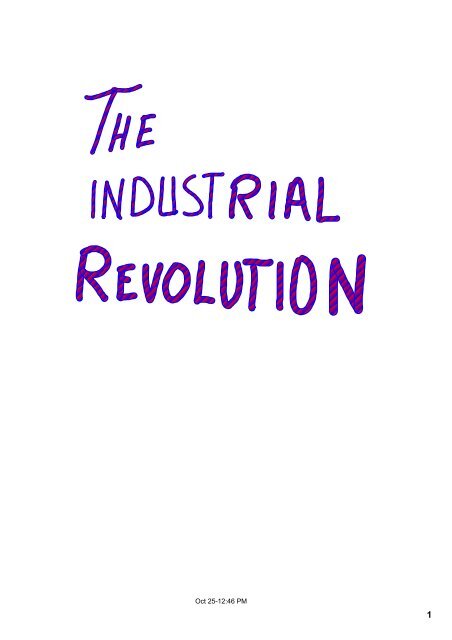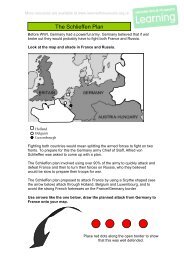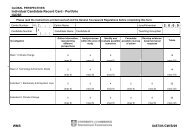Industrial Revolution Causes.pdf - Cambridge College Secondary ...
Industrial Revolution Causes.pdf - Cambridge College Secondary ...
Industrial Revolution Causes.pdf - Cambridge College Secondary ...
You also want an ePaper? Increase the reach of your titles
YUMPU automatically turns print PDFs into web optimized ePapers that Google loves.
Oct 2512:46 PM<br />
1
Oct 2501:23 p.m.<br />
2
Between 1750 and 1850 Britain became an industrial country,<br />
with over 50 per cent of its population living in large cities and over 40<br />
per cent of the labour force working in factories. In contrast, the numbers<br />
employed in farming steadily went downwards.<br />
The changes shown in the diagram above are often called the <strong>Industrial</strong><br />
<strong>Revolution</strong>. This, however, is only a label we use to make what<br />
happened easier to understand. Historians have said that the word<br />
'revolutions is misleading, because it gives the impression of very rapid.<br />
change. In fact, the changes were gradual and part of a process that had<br />
been going on for a. long time. Another thing that historians have argued<br />
about is the reason why Britain became a country of factories, towns<br />
and industry. Some of the possible causes of the <strong>Industrial</strong> <strong>Revolution</strong><br />
are listed below.<br />
A<br />
Britain had large amounts of coal to power the steam engines and plenty of<br />
iron ore to turn into iron.<br />
B<br />
Britain had lots of individuals who, were prepared to risk their money in<br />
starting up new factories. Richard Arkwright and Matthew Boulton are just<br />
two examples.<br />
Oct 2501:23 p.m.<br />
3
C<br />
Britain was a peaceful country. After 1750 no wars were fought in Britain.<br />
D<br />
In 1776 Adam Smith wrote a book called 'The Wealth of Nations' in which he said that the<br />
government should keep out of trade and industry. Smith said Britain would be better off if<br />
people were left to get on without the government interfering. This policy, called laissezfaire<br />
(meaning 'leave alone'), was followed by the government.<br />
E<br />
There were a growing number of banks in Britain. This meant that people could borrow money<br />
to invest into industry.<br />
F<br />
Britain had colonies overseas. These provided British . factories with raw materials (such as<br />
cotton). They were also markets for British factorymade goods.<br />
G<br />
British agriculture was becoming more efficient at this time, producing more food. People<br />
working in factories could therefore be fed.<br />
H<br />
Changes in transport roads were improved and canals built at this time meant that industrial<br />
goods could be moved about more easily.<br />
I<br />
There was a great interest in science and technology. Many new inventions were made (such as<br />
the steam engine) which helped to mechanise the factories.<br />
J<br />
The population Britain grew rapidly between 1750 and 1850. This meant there was a much<br />
bigger demand for<br />
Oct 2501:29 p.m.<br />
4
Questions<br />
Section A<br />
I Make a list of the changes which took place in Britain between 1750 and 1850<br />
2 Is the term the "<strong>Industrial</strong> <strong>Revolution</strong>" a good one? Explain your answer.<br />
Section B<br />
3 Rank the causes of the <strong>Industrial</strong> <strong>Revolution</strong> into what you think is their order of<br />
importance. Explain why you chose this order.<br />
4 Using the information in the boxes write a paragraph explaining why Britain had<br />
on industrial <strong>Revolution</strong>.<br />
Oct 2501:29 p.m.<br />
5
The "domestic System" was what went before at the beginning of the revolution<br />
Do not forget this was the 1st stage: people start specialising e,g, (for example)<br />
farming sheep, buying wool, turning wool into clothe, selling clothe and making<br />
clothes<br />
We will copy<br />
this note later<br />
Oct 2012:36 PM<br />
6
Oct 279:53 AM<br />
7
PEOPLE GET WORK & MORE MONEY<br />
= INDUSTRY = REVOLUTION<br />
& CHANGE<br />
Link to Explanation of social & Economic issues (causes) <br />
powerpoint<br />
Oct 2708:23<br />
8
<strong>Causes</strong><br />
The causes of the <strong>Industrial</strong> <strong>Revolution</strong> were complex and remain a topic for debate, with some historians seeing<br />
the <strong>Revolution</strong> as an outgrowth of social and institutional changes wrought by the end of feudalism in Great<br />
Britain after the English Civil War in the 17th century. As national border controls became more effective,<br />
diseases spread less, therefore preventing the epidemics common in previous times. The percentage of children<br />
who lived past infancy rose significantly as well, leading to a larger workforce.<br />
The Enclosure movement and the British Agricultural <strong>Revolution</strong> made food production more efficient and less<br />
labourintensive, forcing the surplus population who could no longer find employment in agriculture into<br />
cottage industry, such as weaving, and in the longer term into the cities and the newlydeveloped factories.<br />
The colonial expansion of the 17th century with the accompanying development of international trade, creation of<br />
financial markets and accumulation of capital are also cited as factors, as is the scientific revolution of the 17th<br />
century.<br />
Technological innovation was another important factor, in particular the new invention and development of the<br />
steam engine (which later was developed by Fulton into a steam boat) during the 18th century.<br />
The presence of a large domestic market should also be considered an important catalyst of the <strong>Industrial</strong><br />
<strong>Revolution</strong>, particularly explaining why it occurred in Britain. In other nations their were local conflicts (and<br />
wars), such as in France , and the markets were split up by local regions, which often imposed tolls and tariffs on<br />
goods traded between them.<br />
http://schoolswikipedia.org/2006/wp/i/<strong>Industrial</strong>_<strong>Revolution</strong>.htm<br />
Oct 2708:34<br />
9
Go to<br />
Domestic System Notes<br />
Oct 2012:20 PM<br />
10
Attachments<br />
Indust Rev <strong>Causes</strong> Extract.ppt






